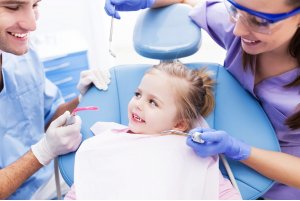Child dental health
Pediatric dentistry it is a treatment and a prevention of oral diseases of the youngest patients. Due to the different structure of the teeth and the chewing organs in children, this is connected with specific treatment and methods of treatment..
 It is very important to give our children receive professional dental care from an early age.
It is very important to give our children receive professional dental care from an early age.
As parents we are responsible for the health of our children.
Let's remember that if we take care of the health of our children's teeth effectively, we will save them many disappointments in the future and we will let them avoid complicated and costly treatment in adulthood.
First visit
When the first teeth appear, parents should bring the child to the dentist (6-12 months). The doctor will assess whether the development of the dentition is going well and set a date for the follow-up visit.
First contact with the dentist is a great experience for the child, which shapes the later attitude to dental office visits.
Proper preparation of the child for the first visit to the dentist and the correct course of the child, are important factors shaping the child's later attitude towards dental treatment. Adaptive visits are designed to familiarize young Patients with the practice and medical staff. During this visit, a physician often plays in the form of a play, soothes the child with a dental office.
Parents should bring their children to check-ups at least once every six months, unless the doctor decides otherwise, because the dental process in the teeth of the milk, due to their poor mineralization (thin layer of enamel), is much faster than in permanent teeth.
Early caries in children begin within a short time after the first milk teeth have ruptured. This is an exceptionally sharp form of tooth decay that can lead to severe tooth decay in a few months. Parents should keep a close watch on their children's teeth. Any discoloration, stains on the teeth are an indication of the most urgent dental consultation.
THE ONLY WAY TO AVOID MOTIVATION IN CHILDREN IS EDUCATION OF PARENTS
Parents are the primary source of infection. Poor oral health of carers increases the risk of caries in early childhood. To minimize the possibility of infecting the baby, the teeth should heal all those in contact with the baby every day. It is best to do this even before the baby is born.
Hygiene and oral prevention in children
Even before the milk teeth are whipped, the baby's mouth should be rinsed regularly with a swab moistened with mild chamomile infusion or boiled water, while gums are being gently massaged. In this way we will be less likely to later brush our teeth and maintain oral hygiene. In the same way, after each meal, wash the first milk teeth, remembering to rub them both on the lips and tongue.
Around the age of 1 we start regular toothbrushes with a toothbrush adapted to the child's age. Up to 5 years of age, brushing is performed by parents or children under careful parental supervision.
Toothbrushes should be adapted to the anatomy of the baby's mouth (small toothbrush head and soft bristles). Until our comfort learns to spit out saliva, we brush the toothless paste.
After this period we introduce paste for children due to the appropriate fluorine content and children's flavors accepted.
In order to prevent the development of caries in our children we must remember:
You should not fall asleep with a teat with sugar or honey,
Avoid sweetening of milk products,
As soon as possible start feeding with a spoon and drink a cup,
Avoid sweets (optionally give them 1 x a week),
Avoid parenting teats and spoons by overdosing with caries.
You should introduce coarse grains into your diet, avoid slurry,
You should ensure baby's oral hygiene from birth,
As soon as possible implement the habit of using a toothbrush and cleaning the teeth,
The child should be taught how to rinse the mouth with antibacterial fluid and to use additional hygienic utensils (eg dental floss).
Properly select a toothbrush to brush your teeth - artificial bristles, brush replacement every 3 months,
Ensure proper tooth brushing time - minimum 2 minutes,
Make sure you choose the right toothpaste toothpaste
In addition, dental treatments are performed to strengthen the teeth, including:
Lacing - otherwise sealing. This is the protection of special resins of sites susceptible to caries (furrows and fissures). This treatment is performed after the first permanent teeth (molars) are removed that are not yet affected by the caries. It is becoming increasingly common to dabble in milk molars.
Lacquer - apply a brush with fluoride varnish on the tooth surfaces to strengthen the enamel and reduce its susceptibility to caries. This run is in conjunction with ozone treatment to eliminate bacteria from the varnish surface.
Lapisation - a procedure that is used when most of the surface of a tooth is so damaged by tooth decay that there is no possibility of filling. This involves overbearing tooth with a bactericidal substance that stops the carious process.
Do you have any questions about treatment?
or call us now:

